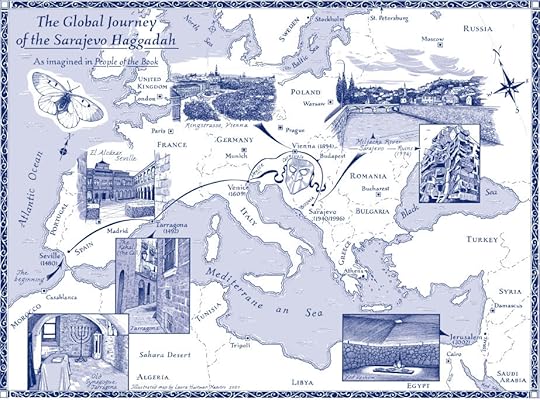Geraldine Brooks's Blog, page 3
July 22, 2015
The Secret Chord
What interests you most about King David? How did you decide to write a novel about him?
When my son was about nine years old, he made the unusual decision to learn to play the harp. (I’d been braced for drums, so I didn’t actually resist the choice.) Watching him, dwarfed by his teacher’s gorgeous concert instrument, I began to think about that other long ago boy harpist, the shepherd who became a king. He’s ubiquitous, after all: a cliché in our language (how many contests are David and Goliath battles?); gorgeously depicted throughout the history of Western art; the psalms attributed to him sung in churches and synagogues across millennia. But who was this warrior-poet-musician, this lover and killer, who experiences every human joy and every human heartbreak? I went back to the bible to look for him, and found that the best stories from his life are the least told ones.
How did you research and prepare to write THE SECRET CHORD?
I started with the period itself, the Second Iron Age, to discover as much as I could about the context for a leader like David. How did tribal power work? What did people eat? How did they fight? What would they have known about the wider world? Archaeology and ancient history answered many of these questions. Others had to be answered experientially. What was it like to herd sheep on a hot afternoon in the Judean hills? My younger son and I went and did it. We also visited sites associated with David, going to places like the Valley of Elah where he clashed with Goliath, Ein Gedi where he hid out from Shaul and exploring the tunnels under Jerusalem where excavations are uncovering buildings of the Davidian period. I talked with Israeli military experts about some of the strategic issues David faced. I consulted experts on early Hebrew music, trying to get a feel for the sound of what David might have played.
As a journalist, you covered the Middle East for the Wall Street Journal. Did your experience with the location and its history enhance your ability to write THE SECRET CHORD?
My first impulse is to say no, because in three thousand years, too much has changed. The flora and fauna are entirely different. The land is dense with millions of people rather than the scattered thousands who lived there in that era. And yet on reflection, a number of experiences did shape my thinking. Covering modern desert warfare, interviewing contemporary despots and seeing how absolute power is wielded, living among people whose lives are entirely shaped, and sometimes deformed, by ardent religious conviction—all these things fed my imagination in some way. Also, in my six years living among the women of the region, I saw how those who may appear to be powerless on the surface, often in fact exert tremendous influence. This helped shape my thinking about the lives of David’s wives, Mikhal and Batsheva.
David is a complicated character—at once a warrior and despot, a lover and adulterer, a poet and composer, a coarse yet refined man of fierce will and great appetites who is also capable of baseness and treachery. In your opinion, what are David’s biggest flaws? What are his greatest strengths?
Well, he’s a murderer, which is pretty hard to get past. He abuses power. He’s also a criminally indulgent parent. But he is paid out heavily for these crimes and flaws. Unlike many of our modern leaders, when he makes a mistake, he admits it. He listens to criticism. I’m drawn to his ardency, his huge capacity for love.
David has been widely depicted in art, literature, and film. Did you consult other portrayals while writing THE SECRET CHORD? Is there anything you feel previous depictions get wrong about him?
I read everything I could find. I watched some truly execrable movies. I revisited favorite art works and discovered masterpieces that were new to me. The Australian painter Arthur Boyd, for example, has a poignant depiction of David and Shaul that taps into the artist’s own pain as the son of a mentally unstable father. Many of the scholarly works, (Pinksy and Wolpe being two notable exceptions) tend to be either/or, black/white, twisting data to condemn or exonerate him. To me it was more interesting to accept the contradictions in his nature, the multi-faceted complexity of it.
How did you decide which stories and characters from David’s life to include in the novel, and which to leave out?
I didn’t leave much out. Perhaps I tended to dwell less on the military campaigns and more on the domestic entanglements. I found myself most drawn to the women in the narrative, the love stories—and, yes, hate-stories– of his many relationships.
The novel is primarily told through the eyes of Natan, the mysterious prophet who becomes David’s direct connection to the divine, his lifelong companion and advisor, and the moral conscience of the novel. Where did you inspiration for Natan come from?
The inspiration came from two references in the bible that I have used here as epigraphs, each of which refers to the lost “book of Natan.” The bible says Natan has given a full account of the lives of David and Shlomo, all their acts, “from first to last.” What would such a man have seen? What would he have known? How would his portrayal differ from the accounts that we do have, in the two books of Samuel, in Kings and in Chronicles? It’s tantalizing, and it took hold of my imagination. I’ve always loved the Hebrew prophets, in any case. These men of huge moral force, these pain-in–the-ass truth tellers who had the guts to castigate their society and its rulers, often in the most exquisitely crafted language. You can feel their fierceness, their penetrating intelligence, their bravery.
You’ve written many historical novels, but none set so far back in time as THE SECRET CHORD. Was it challenging to capture the voice of the period?
I don’t think it’s possible to recapture the voice of a period so distant from our own. What I tried to avoid were the familiar flowery cadences of King James Bible English, striving instead for something that evoked the bluntness and the austere beauty of the biblical Hebrew.
What were the biggest challenges you encountered in the writing of this novel?
David shimmers somewhere in the half-light between history and myth. My challenge was to approach an emotional truth that seemed real and recognizable without losing the sense of the supernatural, the slightly magical aura that surrounds a man we’re told lived his life in the hand of the divine.
The post The Secret Chord appeared first on Geraldine Brooks.
Bring out your (walking) dead?

(Photo by Jerod Harris/Getty Images for MySpace)
Andrew Lincoln as Michael Mompellion in Year of Wonders? His company has optioned the novel. Now, who should play Anna Frith?
The post Bring out your (walking) dead? appeared first on Geraldine Brooks.
Signing Galleys at Book Expo NYC
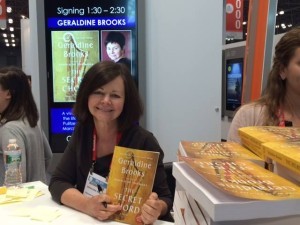
Book Expo at the vast Javits Center can be overwhelming, so it was good to see so many booksellers I know at my signing.
The post Signing Galleys at Book Expo NYC appeared first on Geraldine Brooks.
July 21, 2015
And the winner is…
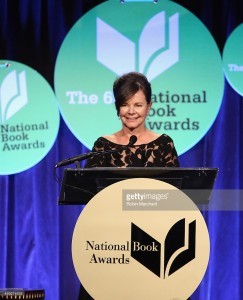
Generated by IJG JPEG Library
Honored to chair the National Book Award’s Fiction jury, and to present the prize to Phil Klay, for Redeployment.
The post And the winner is… appeared first on Geraldine Brooks.
July 19, 2015
The Secret Chord
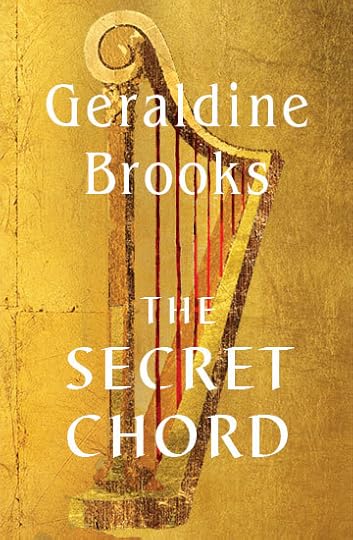 A rich and utterly absorbing novel about the life of King David, from the Pulitzer Prize–winning author of People of the Book and March
A rich and utterly absorbing novel about the life of King David, from the Pulitzer Prize–winning author of People of the Book and March
With more than two million copies of her novels sold, New York Times bestselling author Geraldine Brooks has achieved both popular and critical acclaim. Now, Brooks takes on one of literature’s richest and most enigmatic figures: a man who shimmers between history and legend. Peeling away the myth to bring David to life in Second Iron Age Israel, Brooks traces the arc of his journey from obscurity to fame, from shepherd to soldier, from hero to traitor, from beloved king to murderous despot and into his remorseful and diminished dotage.
The Secret Chord provides new context for some of the best-known episodes of David’s life while also focusing on others, even more remarkable and emotionally intense, that have been neglected. We see David through the eyes of those who love him or fear him—from the prophet Natan, voice of his conscience, to his wives Mikal, Avigail, and Batsheva, and finally to Solomon, the late-born son who redeems his Lear-like old age. Brooks has an uncanny ability to hear and transform characters from history, and this beautifully written, unvarnished saga of faith, desire, family, ambition, betrayal, and power will enthrall her many fans.
Reviews
“In her gorgeously written novel of ambition, courage, retribution, and triumph, Brooks imagines the life and character of King David…The language, clear and precise throughout, turns soaringly poetic when
describing music or the glory of David’s city…the novel feels simultaneously ancient, accessible, and timeless.” –Booklist-starred review
“What Mary Renault did with Alexander the Great, Geraldine Brooks has done with King David: breathed life into an ancient hero. Haunting, exciting and as satisfying in structure as a completed Rubik’s Cube.” — Tom Holland
“Brooks evokes times and place with keenly drawn detail. . .with the verve of an adroit storyteller. . .Ambitious and psychologically astute.” — Publisher’s Weekly
“Brooks continues to explore the meaning of faith and religion in ordinary life. . .she skillfully retells David’s story through the eyes of Natan. . .Of just as much interest as Brooks’ view of the politically astute lion in winter are her portraits of characters who are somewhat thinly fleshed in their biblical accounts, such as Batsheva, Yoav, Avner, even Avshalom. A skillful reimaging gracefully and intelligently told.” – Kirkus Reviews
Buy Links
IndieBound Amazon B & N BAM iBooks GoodReads
The post The Secret Chord appeared first on Geraldine Brooks.
June 29, 2015
The Book of Exodus
A double rescue in wartime Sarajevo.
By Geraldine Brooks
When the Axis powers conquered and divided Yugoslavia, in the spring of 1941, Sarajevo did not fare well. The city cradled by mountains that Rebecca West once described as like “an opening flower” suddenly found itself absorbed into the Nazi puppet state of Croatia, its tolerant, cosmopolitan culture crushed by the invading German Army and the Croatian Fascist Ustashe. Hitler’s ally, Ante Pavelic, who had headed the Ustashe through the nineteen-thirties, proclaimed that his new state must be “cleansed” of Jews and Serbs: “Not a stone upon a stone will remain of what once belonged to them.”
The terror began on April 16th, when the German Army entered Sarajevo and sacked the city’s eight synagogues. The Sarajevo pinkas, a complete record of the Jewish community from its earliest days, was sent to Prague and was never recovered. Deportations followed. Jews, Gypsies, and Serbian resisters turned frantically to sympathetic Muslim or Croat neighbors to hide them. Fear of denunciation spread through the city, penetrating every workplace, even the imposing neo-Renaissance halls of the Bosnian National Museum.
The post The Book of Exodus appeared first on Geraldine Brooks.
Illustrated map by Laura Hartman Maestro
This map is from the inside cover of People of the Book. It was designed by Laura Hartman Maestro. This is for personal use only and may not be reproduced or distributed without written permission. If you would like to use this for your reading group please contact us first.
The post Illustrated map by Laura Hartman Maestro appeared first on Geraldine Brooks.
March: Readers Guide
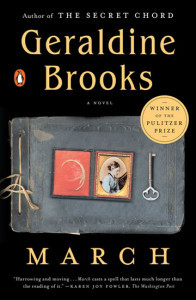 With her critically acclaimed and bestselling novel Year of Wonders, Geraldine Brooks was praised for her passionate rendering and careful research in vividly imagining the effects of the bubonic plague on a small English village in the seventeenth century. Now, Brooks turns her talents to exploring the devastation and moral complexities of the Civil War through her brilliantly imagined tale of Mr. March, the absent father from Louisa May Alcott’s Little Women. In Mr. March, Brooks has created a conflicted and deeply sensitive man, a father who is struggling to reconcile duty to his fellow man with duty to his family against the backdrop of one of the most grim periods in American history.
With her critically acclaimed and bestselling novel Year of Wonders, Geraldine Brooks was praised for her passionate rendering and careful research in vividly imagining the effects of the bubonic plague on a small English village in the seventeenth century. Now, Brooks turns her talents to exploring the devastation and moral complexities of the Civil War through her brilliantly imagined tale of Mr. March, the absent father from Louisa May Alcott’s Little Women. In Mr. March, Brooks has created a conflicted and deeply sensitive man, a father who is struggling to reconcile duty to his fellow man with duty to his family against the backdrop of one of the most grim periods in American history.
October 21, 1861. March, an army chaplain, has just survived a brush with death as his unit crossed the Potomac and experienced the small but terrible battle of Ball’s Bluff. But when he sits down to write his daily missive to his beloved wife, Marmee, he does not talk of the death and destruction around him, but of clouds “emboss[ing] the sky,” his longing for home, and how he misses his four beautiful daughters. “I never promised I would write the truth,” he admits, if only to himself.
When he first enlisted, March was an idealistic man. He knew, above all else, that fighting this war for the Union cause was right and just. But he had not expected he would begin a journey through hell on earth, where the lines between right and wrong, good and evil, were too often blurred.
For now, however, he has no choice but to press on. He is directed to a makeshift hospital, an old estate he finds strangely familiar. It was here, more than twenty years earlier, that he first met Grace, a beautiful, literate slave. She was the woman who provided his first kiss and who changed the course of his life.
Now, he finds himself back at the Clement estate, and what was once the most beautiful place he had ever seen has been transformed by the ugliness of war. However, March’s sojourn there is brief and he finds himself reassigned to set up a school on one of the liberated plantations, Oak Landing—a disastrous posting that leaves him all but dead.
Though rescued and delivered to a Washington hospital where his physical health improves, March is a broken man, haunted by all he has witnessed and “a conscience ablaze with guilt” over the many people he feels he has failed. And when it is time for him to leave he finds he does not want to return home. He turns to Grace, whom he has encountered once again, for guidance. “None of us is without sin,” she tells him. “Go home, Mr. March.” So, March returns to his wife and daughters, and though he is tormented by the past and worried for his country’s future, the present, at least, is certain: he is home, he is a father again, and for now, that will be enough.
Questions for Discussion
1) Throughout the novel, March and Marmee, although devoted to one another, seem to misunderstand each other quite a bit and often do not tell each other the complete truth. Discuss examples of where this happens and how things may have turned out differently, for better or worse, had they been completely honest. Are there times when it is best not to tell our loved ones the truth?
2) The causes of the American Civil War were multiple and overlapping. What was your opinion of the war when you first came to the novel, and has it changed at all since reading March?
3) March’s relationships with both Marmee and Grace are pivotal in his life. Discuss the differences between these two relationships and how they help to shape March, his worldview, and his future. What other people and events were pivotal in shaping March’s beliefs?
4) Do you think it was the right decision for March to have supported, financially or morally, the northern abolitionist John Brown? Brown’s tactics were controversial, but did the ends justify the means?
5) “If war can ever be said to be just, then this war is so; it is action for a moral cause, with the most rigorous of intellectual underpinnings. And yet everywhere I turn, I see injustice done in the waging of it,” says March (p. 65). Do you think that March still believes the war is just by the end of the novel? Why or why not?
6) What is your opinion of March’s enlisting? Should he have stayed home with his family? How do we decide when to put our principles ahead of our personal obligations?
7) When Marmee is speaking of her husband’s enlisting in the army, she makes a very eloquent statement: “A sacrifice such as his is called noble by the world. But the world will not help me put back together what war has broken apart” (p. 210). Do her words have resonance in today’s world? How are the people who fight our wars today perceived? Do you think we pay enough attention to the families of those in the military? Have our opinions been influenced at all by the inclusion of women in the military?
8) The war raged on for several years after March’s return home. How do you imagine he spent those remaining years of the war? How do you think his relationship with Marmee changed? How might it have stayed the same?
The post March: Readers Guide appeared first on Geraldine Brooks.
Geraldine Brooks talks about March
 In your afterword, you make an amusing apology to your husband, a well-known writer and Civil War afficionado, for your previous lack of appreciation for his passion. Although you say you’re not sure “when or where” it happened, would you talk a bit about your change of heart and what led to your new and profound interest in the American Civil War and eventually to the writing of March?
In your afterword, you make an amusing apology to your husband, a well-known writer and Civil War afficionado, for your previous lack of appreciation for his passion. Although you say you’re not sure “when or where” it happened, would you talk a bit about your change of heart and what led to your new and profound interest in the American Civil War and eventually to the writing of March?
In the early 1990s we came to live in a small Virginia village where Civil War history is all around us. There are bullet scars on the bricks of the Baptist church where a skirmish took place; we have a Union soldier’s belt buckle that was unearthed near the old well in our courtyard. The village was Quaker, and abolitionist, but in the midst of the Confederacy. The war brought huge issues of conscience for the townsfolk, a few of whom sacrificed their nonviolent principles to raise a regiment to fight on the Union side. It was thinking about the people who once lived in our house, and the moral challenges the war presented for them, that kindled my interest in imagining an idealist adrift in that war. I am gripped by the stories of individuals from the generation Oliver Wendell Holmes so eloquently described when he said: “In our youth our hearts were touched with fire.” I’m still not all that interested in the order of battles, I still drive Tony crazy by failing to keep the chronology straight, and offered the choice between a trip to the dentist and another midsummer reenactment, it’d be a hard call. But sometimes, alone on a battlefield as the mists rise over the grass, I feel like a time traveler, born back by the ghosts of all those vivid, missing boys.
Grace Clement is such an extraordinary character and is pivotal in shaping March’s life. You tell us that her voice was inspired by an 1861 autobiography, but what inspired you to create a romantic relationship between Grace and March? Were there any historical hints that Alcott had had such a relationship?
The idea of an attraction between March and Grace is entirely imagined and not at all suggested by Bronson Alcott’s biography. It grew naturally out of the narrative: they are young and attractive when they first meet, he is an idealist, she is a compelling person in a dramatic and moving situation. It seemed inevitable to me.
A year after March enlists he says, “One day I hope to go back. To my wife, to my girls, but also to the man of moral certainty that I was . . . that innocent man, who knew with such clear confidence exactly what it was that he was meant to do.” Do you think he can go back? Is it even possible? Would you discuss how you think March changes by the end of the novel and what parts of him remain intact?
I don’t think he can go back. Nor do I think it is necessarily desirable. Moral certainty can deafen people to any truth other than their own. By the end of the book, March is damaged, but he is still an idealist; it’s just that he sees more clearly the cost of his ideals, and understands that he is not the only one who must pay for them.
Your book Nine Parts of Desire deals with the issues of Muslim women. Year of Wonders had a female heroine, Anna Frith. How was it different writing principally from a man’s point of view this time?
I have always believed that the human heart is the human heart, no matter what century we live in, what country we inhabit, or what gender we happen to be. This is a book about strong feelings: love and fear. I can’t believe there’s much difference in how a man or a woman experiences them. And then, I had the journals and letters of Bronson Alcott, which are perhaps as complete a record of a Victorian man’s interior life as any you could find.
It is quite a surprise to suddenly hear Marmee’s voice in Part Two. Can you talk about how and why you decided to change the point of view here?
The structure of March was laid down for me before the first line was written, because my character has to exist within Louisa May Alcott’s Little Women plotline. That meant March has to go to the hospital gravely ill and Marmee has to arrive to tend him. The alternative to switching voices would have been to continue the narrative in March’s voice, disoriented by his delirium. But giving Marmee a voice seemed like an opportunity to me to better explore some of the themes of communication, and miscommunication, in a marriage. Also, the book was written against the tumult of my own feelings about the war with Iraq, and as I started to write in Marmee’s voice I found that she could naturally articulate a frustration, grief, and confusion that seemed in common between us.
The American Civil War was enormously complex with different political, social, economic, and psychological factors all playing a role. What did you learn from your research that may have surprised you and, other than your obvious newfound interest, is your opinion of the war any different now than when you started?
Nations inevitably fall into the trap of romanticizing their militaries and are always astonished when the truth of awful atrocities is revealed, as it inevitably is in almost every war. There were plenty of hate-filled racists in Lincoln’s army, fighting side by side with the celebrated idealists. March’s growing dismay as he learns this in a way reflects my own journey to a more complete understanding.
Would you talk a bit about how your past work as a foreign correspondent informs your current writing? What do you think historical fiction can achieve that nonfiction cannot? Would you ever entertain the idea of writing a novel about current events?
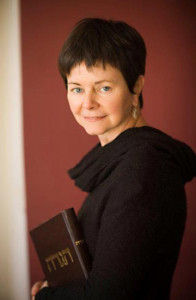 Write what you know. It’s the first advice given to writers. I did draw on some experiences of war from my correspondent years. You see things during war, and you can never unsee them. The thing that most attracts me to historical fiction is taking the factual record as far as it is known, using that as scaffolding, and then letting imagination build the structure that fills in those things we can never find out for sure. And to do that you use all the experiences you can. While I love to read contemporary fiction, I’m not drawn to writing it. Perhaps it’s because the former journalist in me is too inhibited by the press of reality; when I think about writing of my own time I always think about nonfiction narratives. Or perhaps it’s just that I find the present too confounding.
Write what you know. It’s the first advice given to writers. I did draw on some experiences of war from my correspondent years. You see things during war, and you can never unsee them. The thing that most attracts me to historical fiction is taking the factual record as far as it is known, using that as scaffolding, and then letting imagination build the structure that fills in those things we can never find out for sure. And to do that you use all the experiences you can. While I love to read contemporary fiction, I’m not drawn to writing it. Perhaps it’s because the former journalist in me is too inhibited by the press of reality; when I think about writing of my own time I always think about nonfiction narratives. Or perhaps it’s just that I find the present too confounding.
What are you working on now?
Another historical novel based on a true story, but one where the truth is not completely known, and so there are intriguing voids for the imagination to fill. Like March andYear of Wonders it has a lot to do with faith and catastrophe.
The post Geraldine Brooks talks about March appeared first on Geraldine Brooks.
Foreign Correspondence: Readers Guide
In her memoir, Foreign Correspondence, we see how author Geraldine Brooks rebels against and then embraces her secure and rooted upbringing in suburban Sydney, Australia. Brooks becomes a foreign correspondent who travels from war zone to famine and finally arrives at a deeper understanding of the value of family, home, and stability in every person’s life. She tells that story in a way that carries her distinct stamp: she looks at the lives of others.
Throughout her childhood in the turbulent 1960s and 1970s (turbulent almost everywhere but Australia it seemed to a young Brooks) she corresponded with pen pals around the world. More than twenty years later, Brooks is surprised to find that her father has saved those letters. After reading them, she wonders what became of those childhood correspondents, and she decides to find out.
Traveling from Maplewood, New Jersey, to Nazareth, Israel, to St. Martin de la Brasque, France, to a New York City nightclub, Brooks tracks down her pen pals. While doing so she hears stories that cross latitudes and include tales of conscription, anorexia nervosa, peace, security, death, provincialism, and family. She also learns that she and her former correspondents, all grown up now, want many of the same things, and most have little to do with the excitement that she craved when she was a young girl.
As Brooks writes of her former pen pals, “[O]ne of them is dead, one is famous, one has survived wars, one overcome prejudice. And of all of them, it is Janine, living undramatically in the narrow circumference of her tiny village, whose life now seems to me most enviable.”
Read the full guide at Reading Group Guides
The post Foreign Correspondence: Readers Guide appeared first on Geraldine Brooks New Site.

